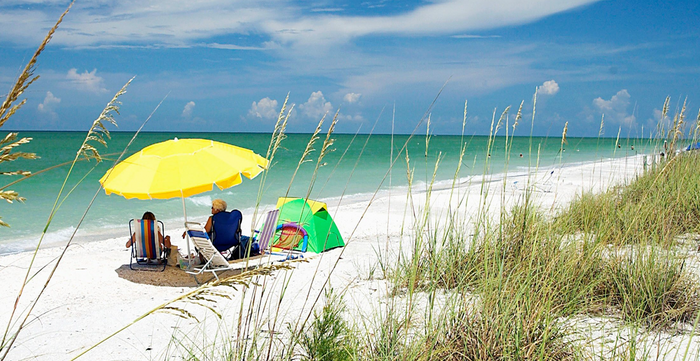Key points
- Jellyfish stings, which can cause severe pain and allergic reactions, are a common hazard on Florida beaches.
- Sharp shells on the beach can cause minor to major cuts, requiring medical attention or protective footwear.
- Shark bites, while less common, are a serious hazard in Florida waters and require immediate medical attention.
- Insect stings and bites are the most common hazard on Florida beaches and can cause severe reactions in those with allergies.
- Insect stings and bites are common on Florida beaches. Most can be treated with simple first aid, but severe reactions may require urgent care. Always look up the nearest urgent care center before heading to the beach.

The beaches of Florida are sunny, welcoming, and a popular spot for vacationers throughout the year. Before you head out to the beach on your Florida vacation, take note of these four hazards to watch out for on the beach.
Related: 2021 Summer Vacation checklist →
#1 Jellyfish
The Florida coastline contains a few varieties of jellyfish including the Moon Jellyfish, the Upside Down Jellyfish, and the Sea Nettle. All of these species have tentacles and can sting you when swimming in the water. If you are stung, you may experience red or raised welts and pain—often the pain can be severe.
You may also experience itching or tingling, headaches, and nausea. One fact not readily known is even dead jellyfish can sting a person. Welts and bumps may last up to two weeks but if you are stung, it's best to find a walk-in clinic near the beach. If you experience difficulty in breathing, chest pain or feel faint, you may be experiencing a severe allergic reaction and should head immediately to an urgent care center.
Because it's unwise to remove jellyfish tentacles on your own, it's best to see a doctor. Always contact the lifeguard if you are stung as they can help provide first aid and set up "purple flags" that announce marine wildlife in certain areas.
FAQs
What should I do if I get stung by a jellyfish in Florida?
Seek immediate medical attention and contact a lifeguard. Even dead jellyfish can still sting.
How can I avoid getting cut by shells on Florida beaches?
Wear sturdy footwear, particularly when walking in the sand or playing in shallow water.
What should I do if I see a shark in Florida waters?
Try to stay still and calm. If bitten, seek immediate medical attention and notify a lifeguard.
What are the most common insect bites or stings on Florida beaches?
Sand flies, mosquitoes, bees, and wasps are common. If you're allergic, seek medical attention immediately.
Are there sharks in Florida waters?
Yes, there are many varieties of sharks in Florida waters including the Blacktip, Bonnethead, Bull, Hammerhead, Lemon, Nurse, and Tiger shark.
What should I do if I see a shark while swimming?
If you see a shark while swimming, try not to move and most likely the shark will pass you by. If you are bitten, know the urgent care locations near the beach so you can head there immediately for treatment. Lifeguards can also call for emergency care help and shut down swimming in shark infested areas.
What are some common insects on Florida beaches?
Some common insects on Florida beaches include sand flies, mosquitoes, bees and wasps.
How can I prepare for potential medical emergencies on Florida beaches?
Before heading to the beach, do an Internet search on "urgent care near me" so you'll be prepared if emergency care is needed. It's also important to pay attention to the four Florida beach hazards mentioned in the article.









